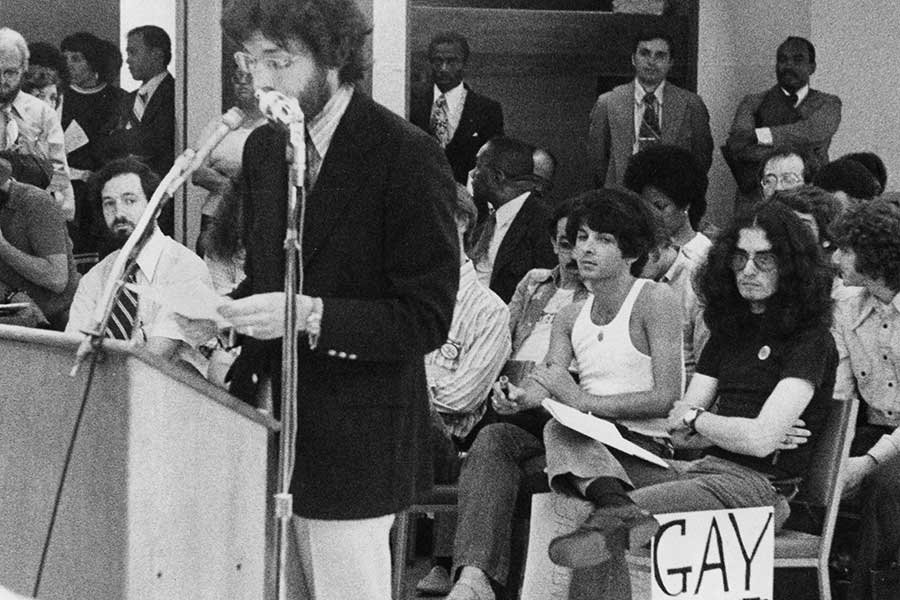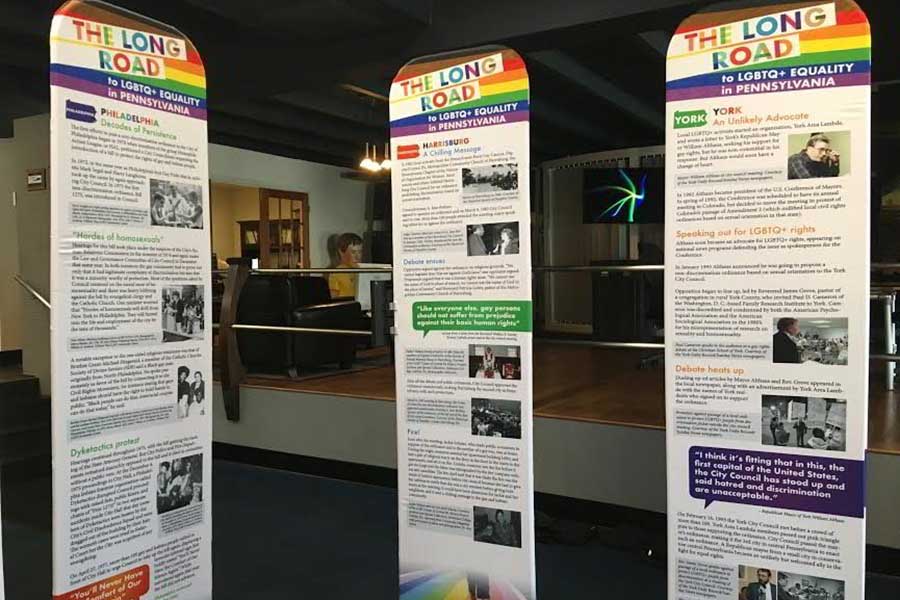A traveling exhibit exploring the histories of Pennsylvania municipalities that have fought for LGBTQIA-plus nondiscrimination ordinances will be on display at the William Way LGBT Community Center’s Archives Gallery from Sept. 2-20.
“The Long Road to LGBTQ+ Equality in Pennsylvania” was created by the Pennsylvania LGBT History Network, a coalition of individuals and organizations dedicated to preserving queer stories, in partnership with the History Project, an archiving initiative operated by the LGBT Center of Central PA. Launched in Harrisburg in March, the exhibit has snaked its way through towns including Lancaster, Carlisle, Erie and Allentown to inform people of more than 50 years of attempts to achieve LGBTQ equality in the Keystone State.
The groups wanted to honor the efforts of LGBTQ activists in the state in commemoration of Stonewall 50, said Barry Loveland, History Project chair. To do so, the exhibit focuses on something municipalities across Pennsylvania have in common.
“It’s been a long road because we have not been successful so far in achieving [nondiscrimination] statewide legislation,” Loveland said. “It’s been really a case of working at the local level in passing nondiscrimination ordinances and other protections from city to city and township by township.”
As of April, at least 55 of Pennsylvania’s 2,562 municipalities have passed local LGBTQ nondiscrimination ordinances — the most of any state in the U.S., according to research by the Pennsylvania Youth Congress. About one-third of Pennsylvanians live in these locations.
Three identical copies of the exhibit have circulated through about 45 destinations across Pennsylvania, stopping at universities, LGBT community centers and high schools. While the display was initially slated to run through December, due to an excess of requests, it will run to at least the end of the 2019-20 school year, Loveland told PGN.
The presentation consists of six double-sided panels displaying text and images, while accompanying videos play oral history interviews with people discussing the effects of having or not having a nondiscrimination ordinance in their hometown.
“Pennsylvania has had to do this sort of [work] by piecemeal,” said John Anderies, director of William Way’s John J. Wilcox, Jr. Archives. “The fact is that while there’s been a lot of them that have passed … that’s still such a minority of the state.”
The Pennsylvania Human Relations Act of 1955 allows the state’s municipalities to pass individualized local nondiscrimination ordinances that outweigh state law. In 1982, Philadelphia became the first Pennsylvanian municipality to pass such a city ordinance protecting gay and lesbian people. Similar protections were extended to trans folks two decades later in 2002.
Harrisburg was the first to follow the City of Brotherly Love’s lead in 1983, when a nondiscrimination ordinance was unanimously passed in the state capital, Loveland said.
But the traveling exhibit stresses the trials and tribulations that accompanied passage of the state’s local ordinances.
In Harrisburg, a woman who testified to City Council in support of the guideline had her front door set on fire, using religious material as kindling, Loveland said. In Lancaster, where an equality ordinance passed in 2001, the decision was met by protests by the Ku Klux Klan, while a lesbian bookstore owner was forced to shutter her business after two firebombings scared away clientele.

Tom Wilson Weinberg testifying in favor of LGBTQ nondiscrimination in Philly in 1974. Photo: Courtesy John J. Wilcox, Jr. Archives.
Meanwhile, York’s 1998 legislation was pushed forward by a Republic mayor, which, Loveland said, “was pretty amazing then and pretty amazing now, even.”
When Tom Wilson Weinberg was 24 years old, he testified in front of Philadelphia City Council in 1974 in support of LGBTQ nondiscrimination ordinance Bill 1275 after he and his comrades struggled to find a landlord that would allow them to open the historic gay bookstore Giovanni’s Room. An active member of the Gay Activists Alliance, Wilson Weinberg decided to speak up.
While giving his testimony, he felt nervous and noted some of the City Council members “were rather disrespectful.” When Bill 1358, the later iteration of Philadelphia’s nondiscrimination ordinance, passed eight years later “it felt like a great victory.”
Wilson Weinberg, now 74, said he hopes people realize the fight for LGBTQ equality in Pennsylvania has been “a tremendous struggle,” largely due to Republican lawmakers blocking legislative attempts.
“It had to be done municipality by municipality,” he told PGN. “That’s a good thing, but it’d be a lot better if the Democrats had the majority in the State House and the State Senate. We wouldn’t have to be doing it town by town, but the fact that more and more towns come aboard I think indicates that eventually, it’s going to happen.”
The exhibit’s creators similarly hope it strikes a chord with viewers about the importance of continuing the fight for statewide nondiscrimination protections.
“It would protect people in tiny little municipalities in the middle of the state where seemingly there may be no one to support a young trans person or anyone that’s LGBT. … We are living in times where, if not that, there’s a growing number of people who are against us…at least we’re living in a time where it’s more sanctioned for people to spew venom about our community,” Anderies said.
According to Loveland, “A lot of people take for granted that these ordinances have been around for many years, and they don’t think about what it took in terms of sacrifices and hard work to get those protections put in place. I hope they will have an appreciation for what’s been accomplished but also an understanding of what’s not been accomplished yet.”

